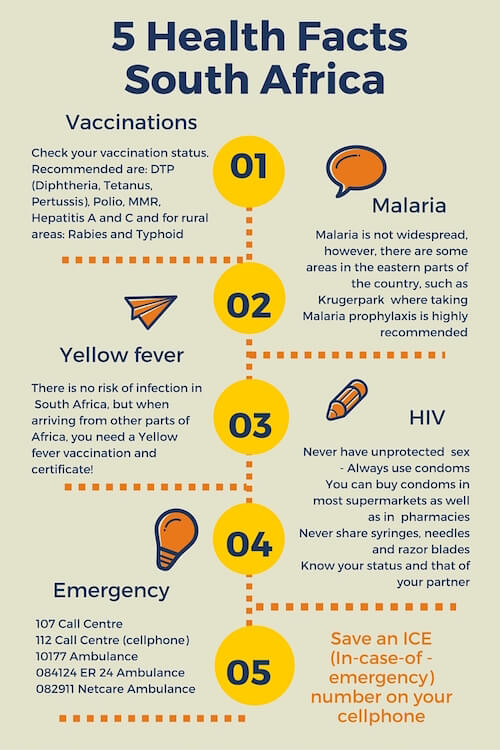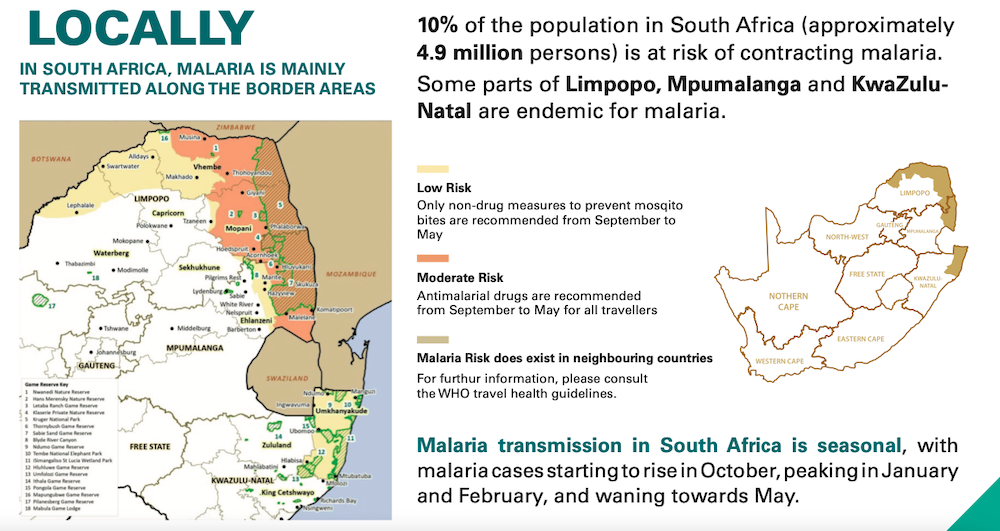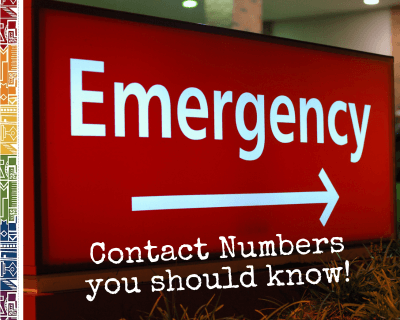South Africa Health Facts
All you have to know when visiting or moving to South Africa
Are you looking for reliable South Africa Health Facts? Then you should check out our travel health info here. Our South Africa Health Facts will provide some insights on how to protect your health when traveling to South Africa or living in Cape Town.
Moving to South Africa | Living in South Africa

In South Africa you should take special precautions regarding your health in some regard. HIV/ Aids is widespread, the risk to contract hepatitis or TBC/ tuberculosis when working in townships or rural areas is prevalent and rabies and typhoid are present in rural areas. There are special precautions to take, and for most of the more common diseases it is imperative to get the standard vaccinations before your travels. It is highly recommended to contact your health care provider or a travel health clinic before you move here or get help here at a local travel clinic. Make sure your immunisation record is up to date or get refresher vaccinations - especially for DTP (Diphtheria, Tetanus and Pertussis/ Whooping Cough) and MMR (stands for the three viral diseases: Measles, Mumps, Rubella).
South Africa Health Facts
Seasonal Influenza is present during the winter months in South Africa as in many other places around the world. Flu season in South Africa is typically from end April to mid June, but as in 2025 can be as long as from end March to end July! Due to the effects of international travels, there is always a chance to catch flu viruses that are in circulation in other parts of the world too. There is evidence that not only small children and older or frail people are more at risk, but also teenagers and pregnant women. So if you belong to a high-risk group you should consider the relevant vaccinations to be protected against the most typical variants. Vaccinations can be received at local pharmacies or at your general practitioner (GP). See the influenza updates here.
Make sure to plan in enough time for the vaccinations to work. Below you will find a standard vaccination schedule. Please discuss this with your health care practitioner! This is just a rough guideline, not medical advice!
- Diphtheria, Tetanus, Polio (DTP): 3 doses over 12 months
- Measles, Mumps, Rubella (MMR): Check with your doctor re: mainly childhood diseases
- Hepatitis A and B: 3 doses over 6-18 months
- Tuberculosis (TB): BCG one shot, preferrably at least 6 weeks before travel
- Yellow Fever: The vaccination has to be taken 7-10 days before travels to an infected area. Read here which areas in Africa are affected.
- Typhoid: one shot at least two weeks before travel, highly recommended if working/living in rural areas, then booster every two years afterwards
- Meningitis: There are various types of vaccines available, best to enquire with your travel clinic
- Malaria: tablets for protection you need to take a prophylaxis if you travel into certain regions in South Africa, not in the Western Cape or Cape Town. Common prophylaxis (usually doxycycline tablets for travellers above 8 years) needs to be taken the day before travel into the malaria regions in South Africa and at least one week after travels. Please note that there is prophylaxis that has to be started already one week before travels, so make sure to see your GP or pharmacist in time.
To get your vaccination status updated, visit any travel health clinic or enquire with your general practitioner (GP) for advice.
Cape Town Travel Clinics | South Africa Health Facts
When already in Cape Town, make sure to have your vaccination card/booklet with you when making an appointment with a local doctor or nurse. Netcare Travel Clinics are good clinics to get on top of your vaccination schedule. Check out the Netcare and Medicross facilities in Pinelands, Table View, Fish Hoek, Tokai, Kenilworth and other locations.
Then there is the "Taveldoctor" in Durbanville, Dr Evert Bouwer, quick and easy to access for all those who are located in the northern suburbs of Cape Town.
Cape Town PCR test centres | PCR test centres for travellers
PCR tests are done at various labs and test centres across Cape Town:
- Ampath Laboratories: Test results usually within 12-24 hours, enquire with them directly
- Pathcare Laboratories. Click here to check their website with contact details for more info.
- Dis-Chem at various shopping centres, offers antigen self-test kits. Check their website.
Be informed and check your South Africa Health Facts and Information thoroughly. Stay safe and keep well!
South Africa Health Facts | ExpatCapeTown | Last updated 15 September 2025
Image Source: own graphic/Canva
South Africa Health Facts | Related Pages
South Africa Health Facts: Resources
- National Institute for Communicable Diseases. "Malaria Poster". NICD. Last accessed 15 September 2025.
- National Institute for Communicable Diseases. "South Africa-Alerts." NICD. Last accessed 15 September 2025.
- World Health Organisation. "South Africa." WHO. Last accessed 15 September 2025.
- Centers for Disease Control and Prevention. "Health Information for Travellers to South Africa." CDC. Last updated 23 April 2025. Last accessed 15 September 2025



